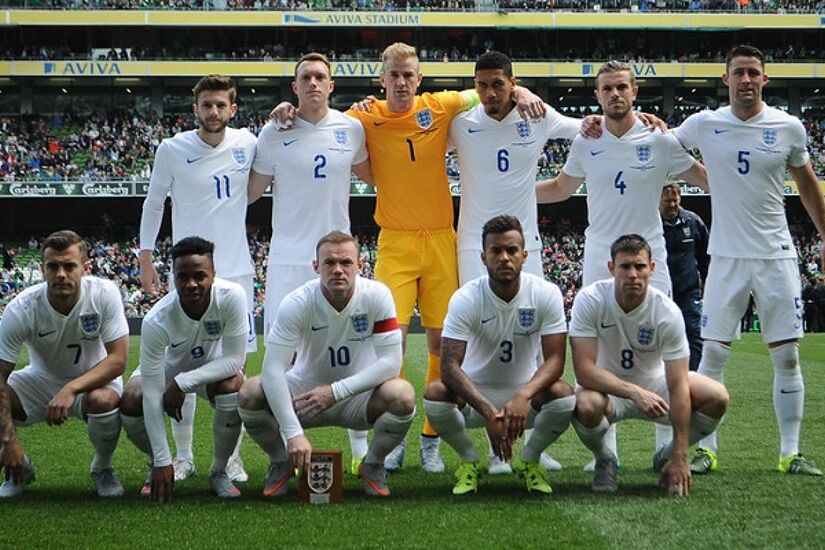So who are England, the Republic of Ireland's friendly opponents?

Credit: Eoin Smith (ETPhotos)
Stephen Kenny’s search for a first win as Republic of Ireland manager continues with a visit to face England in a friendly before vital UEFA Nations League games with Wales and Bulgaria.
The English have been on something of a roll in recent years with a World Cup semi-final appearance and a Nations League final among their recent achievements.
Gareth Southgate’s side face Belgium and Iceland as they conclude their latest Nations League campaign in the coming days but first comes a reunion with one of their oldest opponents.
But who exactly are England, and who, if anyone, will League of Ireland fans recognise among the Three Lions squad? As ever, extratime.com has you covered. We ask…
Who are England?
England is a dependent territory of the British Empire located east of Liverpool and most recently populated by an English-speaking people known as the English.
Historically, England’s biggest exports include copper, tin and the conquest and subjugation of foreign nations for 800 years.
Today, England’s primary exports include disgruntled EU citizens, Republic of Ireland internationals and Tommy Robinson.
Their main imports include disgruntled former EU citizens, former Republic of Ireland internationals and Tommy Robinson.
Both sides will wear their change kits for the game, Ireland lining out in white, rather than the traditional green, and England in blue, rather than their traditional black and tan.
England's traditional rivals are Afghanistan, Albania, Algeria, Angola, Antigua and Barbuda, Argentina, Armenia, Australia, Austria, Azerbaijan, The Bahamas, Bahrain, Bangladesh, Barbados, Belgium, Belize, Benin, Bhutan, Bosnia and Herzegovina, Botswana, Brazil, Brunei, Bulgaria, Burkina Faso, Cabo Verde, Cambodia, Cameroon, Canada, Chile, China, Colombia, Comoros, Costa Rica, Croatia, Cuba, Cyprus, Czech Republic, Democratic Republic of the Congo, Denmark, Djibouti, Dominica, Dominican Republic, East Timor, Ecuador, Egypt, El Salvador, Equatorial Guinea, Eritrea, Estonia, Eswatini, Ethiopia, Fiji, Finland, France, Gabon, Gambia, Georgia, Germany, Ghana, Greece, Grenada, Guinea, Guinea-Bissau, Guyana, Haiti, Honduras, Hungary, Iceland, India, Indonesia, Iran, Iraq, Ireland, Israel, Italy, Jamaica, Japan, Jordan, Kazakhstan, Kenya, Kiribati, Kosovo, Kuwait, Laos, Latvia, Lebanon, Lesotho, Liberia, Libya, Lithuania, Madagascar, Malawi, Malaysia, Maldives, Malta, Mauritania, Mauritius, Mexico, Micronesia, Moldova, Montenegro, Morocco, Mozambique, Myanmar, Namibia, Nauru, Nepal, Netherlands, New Zealand, Nicaragua, Niger, Nigeria, North Korea, North Macedonia, Norway, Oman, Pakistan, Palau, Palestine, Panama, Papua New Guinea, Peru, Philippines, Poland, Portugal, Qatar, Romania, Russia, Rwanda, Saint Kitts and Nevis, Saint Lucia, Saint Vincent and the Grenadines, Samoa, San Marino, Saudi Arabia, Scotland, Senegal, Serbia, Seychelles, Sierra Leone, Singapore, Slovakia, Slovenia, Solomon Islands, Somalia, South Africa, South Korea, South Sudan, Spain, Sri Lanka, Sudan, Suriname, Switzerland, Syria, Taiwan, Tanzania, Thailand, Togo, Tonga, Trinidad and Tobago, Tunisia, Turkey, Turkmenistan, Tuvalu, Uganda, Ukraine, United Arab Emirates, United States, Uruguay, Vanuatu, Venezuela, Vietnam, Wales, Yemen, Zambia and Zimbabwe.
What is their international pedigree?
The Republic of Ireland have faced off with England 16 times, the most recent of which was a 0-0 draw in Dublin in 2015, since when nothing substantial has happened politically.
The small European nation is recognised as the birthplace of the sport of football and it was here the game was codified in 1863 as ‘association football’ – or ‘soccer,’ as they continue to call it.
The Football Association emerged from a schism with the Rugby Football Union over the right to kick players in the shins, a practice continued to this day by the talismanic Harry Maguire.
As the game spread north, it reached Scotland where, like the English language before it, it was instantly improved by the locals.
The Scots’ introduction of passing increased the game’s appeal in the industrial northern cities of England where, like the English language before it, it was instantly improved by the locals.
After boycotting the first World Cup in 1930 due to an inherent distrust of foreigners, England’s palmares arrived in 1966 when they won the World Cup on home soil.
The legendary Jack Charlton marked Portugal’s icon Eusebio out of the game in the semi-final by kicking him in the shins, a practice continued to this day by the talismanic Harry Maguire.
England won 4-2 in the final against Germany as Geoff Hurst scored a much-contested goal that may or may not have bounced over the goal line, a quandary technology is yet to solve.
The years since have been fallow for England, though they did register a creditable 1-1 draw with Ireland at the 1990 World Cup, until the most recent tournament in Russia.
Led by human Pez dispenser Gareth Southgate, England agreed to be eliminated by Croatia in extra time rather than on penalties, a most ungentlemanly way of finishing a game the English boycott as a matter of principle.
Who will League of Ireland fans recognise?
Eagle-eyed Ireland fans may recognise Jack Grealish and Declan Rice from Ireland under-21 and senior squads past.
Grealish played for Ireland up to Noel King’s under-21 side and Rice earned three caps for Martin O’Neill’s senior side, so neither is likely to have lingered in the memory.
Dundalk fans will recognise defender Ainsley Maitland-Niles from the Lilywhites’ recent Europa League defeat to Arsenal.
Shamrock Rovers fans may also be familiar with striker Harry Kane from their Europa League campaign in 2011.
The striker scored his first Tottenham Hotspur goal in Tallaght and would go on to have a successful loan spell with Norwich City.
Do you feel like you have a better idea of who Ireland’s friendly opponents England are now? If so, please consider becoming a patron of extratime.com for just €4 a month to help us cover running costs.

